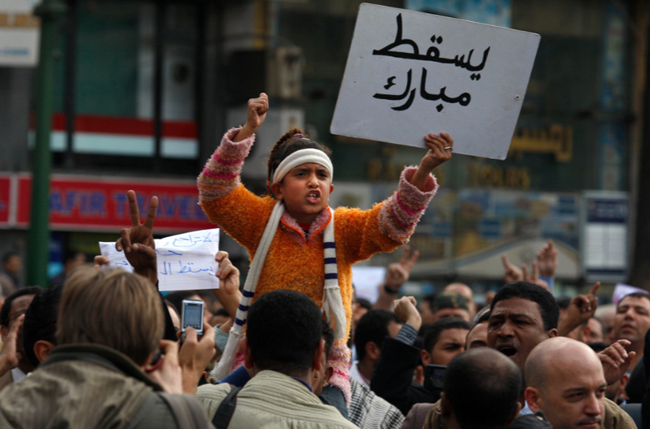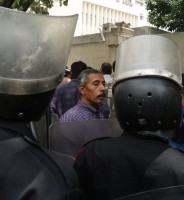
It’s been exhilarating to watch Tunisians, Egyptians and Yemenis take to their streets and demand an end to the dictatorial regimes controlling their lives for decades. But it’s exhilaration mixed with dread, doubt, disappointment and embarrassment.
The dread: That the guns trained on the protesters of Tahrir Square in Cairo will eventually open fire, just as they did in China’s Tiananmen Square in 1989, ending that country’s brief grab for democracy after three weeks of demonstrations. The Egyptian military tells protesters it won’t open fire as long as the protests are peaceful. That’s a cue for the government’s agents provocateurs to light the fuse when the time comes.
The doubt: That the follow-through in any of these Arab nations will be as democratically sustained as the revolutionary passions fueling the movements. Too few credible opposition leaders are ready to assume leadership. That’s what happens after decades of dictatorship: there are no trained leaders to step in. And too many forces are arraigned against the movements, including, sadly and pitifully, the United States.
Click On:
- My 10 Predictions for 2011
- Egypt Awakes, Mubarak Thugs Up, Obama Freezes
- Tiananmen Forebodings in Cairo
- Pierre’s Columns
The disappointment: To see the rest of the Middle East, where freedom and democracy are no less alien, sit out the movement. Where are the protesters of Algeria, Libya, Morocco, Jordan, Syria, Saudi Arabia and Iran, each a nation with unelected, illegitimate leaders? Where, for that matter, are the protesters of Iraq and Afghanistan, where the American illusion of democracy is not nearly as convincing as the authoritarian regimes in place now? Qatar’s al-Jazeera has been providing gripping, round-the-clock live coverage of the revolutions. Egypt just censored al-Jazeera’s broadcasts anywhere in Egypt and revoked the accreditations of the satellite station’s journalists in Egypt. But it’s not as if Hamad al-Thani, the leader of Qatar, who founded and funds al-Jazeera—enlightened and more liberal than most Arab leaders as he may be—is any more legitimate than his cohorts elsewhere in the region. He breaks fewer skulls, Qatari prison conditions are not significantly different than Florida’s, but he’s still an unelected leader ruling by those old and wacky presumptions of hereditary or divine right (the Moroccan king actually thinks he’s a descendant of Mohammed, though by DNA he has more in common with Pee-Wee Herman).
The Live Column
The embarrassment: To hear the leader of the Arab League—a league of 22 nations, 20 of them entirely undemocratic and therefore illegitimate—call for multi-party elections in Egypt, as he did Sunday, after sitting out that sort of declaration for as long as the league has been around. That’s to be expected from the current crop of Arab leaders. Far more embarrassing is to hear Barack Obama and Hillary Clinton sound no different than the leader of the Arab League: vague declarations about the need for elections, but no commitment for democracy now, no conviction, no inspiration for the protesters, certainly no endorsement of their demonstrations, and continued tacit support for Mubarak. It’s American-made tear gas, after all, that’s been raining down on protesters, part of the $1.5 billion in military aid the United States sends Egypt every year. No let-up of that rain in the forecast.
“This is an ongoing conversation that American officials have had for 30 years,” Clinton told an interviewer on Sunday. And what has that achieved?
It’s Not Just the Last 30 Years
There’s also a false demarcation between the Mubarak years and the years that preceded them. Democratically speaking, Mubarak was neither an improvement nor a step back from the regime of Anwar el-Sadat that preceded it, no matter how much and how justifiably the West admired Sadat for making peace with Israel. Sadat, too, was a dictator in his 11 years as Egypt’s president, as brutal and unforgiving as Mubarak. It was in Sadat’s prisons that Ayman al Zawahiri, al-Qaeda’s Number 2 man today, was tortured, and in his prisons that Zawahiri’s vision of a Muslim caliphate turned from a peaceful one to a violent one. Sadat was no improvement from the preceding regime of Gamal Abdel Nasser, no matter how much the Arab world admired Nasser for briefly appearing to give Arabs some dignity in the face of Western or Soviet designs. Mubarak, in sum, extended by 30 years a non-democratic, dictatorial habit of rule that has defined modern Egypt and the greater Middle East.
Which is what makes these demonstrations so remarkable, and so tenuous.
Not Quite the Middle East’s 1989

The comparison with Eastern Europe chucking off 45 years of Soviet oppression in 1989 is tempting. But it’s inaccurate. It raises false hopes resting on false parallels, particularly since this time around the United States is on the wrong side of history, the down side of influence, the backside of respect: you don’t see on Tahrir Square, as you did in Tiananmen Square 22 years ago, anyone brandishing replicas of the Statue of Liberty. You won’t even see Barack Obama’s face on placards and mugs, as you did in Cairo two years ago, when he delivered another one of what, in retrospect, was an empty-hope speech about the West’s relations with the Muslim world.
In 1989, the nations of Eastern Europe were liberating themselves from oppression with unqualified American support. They were returning to the democracies they’d been before World War II. They were getting rid of the Soviet Empire’s hold, an empire that itself would vanish two years later. But the Middle East today, from Morocco and Mauritania in West Africa all the way to the border of Pakistan in South Asia, is what the Soviet empire was in the 1980s—a black hole of repression and regression—with significant differences.
Four Differences
First, Eastern Europe’s oppressed nations were still well educated, so they were well positioned for a re-start in 1989. And they’d all had democratic traditions before 1939. Education in the Greater Middle East is so poor and so discriminating that it ranks somewhere in the neighborhood of crimes against humanity. And aside from Lebanon, the Palestinian territories, Turkey, Israel and, briefly, Iraq, the Middle East has never known democracy. It has no place to re-start from. It would all be brand new.
Second, Eastern Europe’s oppression was largely imported and fueled from Moscow. In Egypt, in Algeria, in Saudi Arabia and all the other undemocratic abysses of the Middle East, the oppression is home grown, one independent from the other, though each reinforcing the other as if by tradition and solidarity, the way Europe’s old monarchies reinforced each other before 1789. Leaders like Mubarak and the now rather putrid monarchies of Morocco, Saudi Arabia and Jordan, play on the cult of personality, the father-of-the-people fantasy that appears to have a few frames left in the reel.
But the majority of the Middle East’s autocracies and dictatorships—including Egypt, Tunisia, Morocco, Algeria, Saudi Arabia, Jordan—are all American client states, all aided and armed by the United States. Their police states’ thugs are trained by the United States. Their truncheons and ammo are manufactured by the United States (jobs! Jobs!). Their dictators are legitimized, wined, dined and largely enabled, in the eyes of each country’s masses, by the United States. In oil-producing nations, those dictators are largely financed by American gas-guzzling: the difference between the Saudi Arabian and North Korean police states is one of degrees, not of substance. In some degrees—women’s rights and the religious policing of “vice”—Saudi Arabia is more oppressive, making it little different than the Taliban. Yet Saudi Arabia is one of America’s closest allies—without, of course, a peep from the American public’s conscience (a conscience whose civil and human rights synapses have been brain dead roughly for as long as Mubarak has been in power anyway).
Third, when Eastern Europe was breaking its Soviet chains, the Soviet Union was exhausted economically. The United States isn’t there yet, though at the current pace it’s on its way. American dollars still finance Arab and Middle Eastern oppression. American troops are still on Arab soil in more than half a dozen Middle Eastern nations. And American strategy still hinges on that axis of authoritarianism that keeps the people quiet: it’s easier for American presidents to deal with less than two dozen robed and titled thugs than to deal with the noisy democracies of 350 million Arabs.
Fourth, American calculations over Eastern Europe weren’t distorted by American vassalage to Israel and American distortions of the Islamic threat. They very much are in the Middle East today. The Obama administration’s reluctance to endorse democracy in Egypt as in the rest of the Middle East results from fears that, as in Gaza, democratic elections would lead to Hamas-like leadership by such parties as the Muslim Brotherhood. It’s a narrow-minded, frankly stupid and often bigoted view that reduces and defines all Arabs according to American prejudices and ignorance—as opposed to American ideals and traditions.
An Avalanche of Fearful Misconceptions

There’s not enough space to set straight a half century of American stereotype about Arabs and Islam, so let’s just take the Egyptian Muslim Brotherhood, the closest thing Egypt has to an organized opposition: It is not a clone of al-Qaeda. It explicitly rejected al-Qaeda in the 1990s because of al-Qaeda’s embrace of violence, just as it rejected violence as a legitimate, let alone an Islamic, tactic. It is a conservative organization, but in the sense that America’s religious right organizations are conservative. It has no less democratic aspirations, and respects social work on behalf of the poor as an institutional responsibility far more than the American religious right does. That’s largely where the Muslim Brotherhood gets its respect in Egypt—from masses in a country where the majority of its 82 million people live in abject poverty, to the indifference of the government.
Egypt has a peace treaty with Israel. But Sunni Egypt in 2011 is not Shiite Iran in 1978: the revolution unfolding in Egypt is not ideologically driven. It is politically driven. Iran wanted to spread the Shiite creed in 1978. Egyptians just want to have their own democracy. They have zero interest in spreading anything, being too busy trying to survive, and needing, at most, to spread a little wealth around at home. They need the peace treaty with Israel the way they need to keep the Suez Canal safe and sound: both have been among their few economic boons. So has the break from going to war every seven years. They’re not about to mess that up.
“A Republic, If You Can Keep It.”
Benjamin Franklin was asked on the street about what had just been achieved. The question elicited one of his more famous quips: “A republic, if you can keep it.” Egyptians could create for themselves the same hopeful circumstances, in roughly the same, unfortunate isolation as the United States were in 1787, though the Egyptian model would unquestionably have an Egyptian, not a western, imprint.
It would be wrong to say that America is losing legitimacy in Arab eyes for refusing to embrace the democratic movement, that legitimacy having been squandered many times over in the past few decades, the past 10 years especially. To Arabs, American prevarication, the rank hedging of bets, is no longer surprising. It’s the usual hypocrisy, the usual cynicism of the last several decades.
Besides its shaky legs, that’s the most disheartening thing about the Egyptian revolution, and its echoes elsewhere in the Middle East: The imprint of American ideals, of inspiration, of aspirations, is gone. The United States is no more revered politically in the Middle East today than the Soviet Union was in Eastern Europe in the 1980s. In some regards it’s despised (think American indifference to human rights violations, think blind American support for Israel). It is still revered for its materialism, for its KFC’s and sitcoms and shoot-em-up movies, even for its universities for the lucky rich few who can make it there. But materialism is no substitute for the more powerful emblems once indistinguishable from the American brand abroad: liberty, democracy, support for the oppressed.
That brand is no longer sold in Egypt or the Greater Middle East, except in the souvenir shops of old sentimentalists.
![]()
Pierre Tristam is the editor of FlaglerLive.com. Reach him at [email protected].





























Frances says
I think this is a very harsh analysis of America and the situation in Egypt. It very complicated and revolts don’t necessarily bring a better life for those revolting. That has been proven over and over again in that part of the world. America is not perfect and many mistakes have been made. The US still stands for many good ideals and excellent values other than materialism. Some good points are made in the article, but I do not agree with the harsh evaluation of our government. I just hope our friends in Cairo get out and can return home. My thoughts and prayers are with them and the Egyptian people as they try to live through a very turbulent difficult time.
Frances says
After reading what I wrote, I wanted to make one thing clear that I did not. I understand and support the Egyptians who are revolting. The people there have not had the rights that we all take for granted here and they deserve a better way of life. I do not support Mubarak in any way and feel that he should already have stepped down. This could be the beginning of a better life for them and I am certainly hoping for that. I disagreed with the harsh analysis of the part that America plays and continues to play in that part of the world.
Brian DelVecchio says
Insightful commentary but classic over-analysis. After 2 days of hearing similarly weighty analysis about what Pittsburgh has to do to beat Green Bay in the Superbowl, I almost tore my car radio from the console and tossed it out the window in disgust. Humans are no different than any other animal, and so I can sum this revolution up in one sentence: uncertainty causes anxiety. Explanation: At 82 Mubarak, the alpha lion, is showing signs of weakness, both physically and politically (Obama beat McCain because Americans were anxious and had absolutely no faith in a decrepit old man leading them out of the grave trouble into which Bush led us). Democracy however, regardless of the outcome, is the mechanism by which humans eliminate the chaos we see in a change of leadership among other species. As you do correctly point out though, without such a process after 30 years of rule, what you get is pandemonium.
Kat says
Americans don’t want to hear about our dear country’s role in maintaining dictatorships in the Middle East. But it is reality just the same. About $1.3 billion of the $1.5 billion sent in aid to Egypt last year went to the military. We maintained the oppressive regime for 30 years and no amount of dissonance can change it.
Egyptians saw that the 81-year-old Mubarak was grooming his son to take his place as head tyrant. It is a great time for a transition and I wish the people success.
William says
Frances says: “I think this is a very harsh analysis of America and the situation in Egypt.”
Not quite. If anything, it is far too mild an indictment of US geopolitical aspirations. The US government has a very checkered history of getting into bed with authoritarian regimes. We (officially) bleat endlessly about human rights violations, yet have had a “close ally” who provided us with black sites, torture, and disappearances. We speak great words espousing the virtues of democracy, yet provide a tyrant massive military sopport, so that said democracy can be strangled with an iron fist. We champion fair and free elections, but drown in our silence when rampant fraud all but slaps us in the face.
This is not to say that the American people themselves would condone such raging hypocrisy, most people I know are kind and good at their core. They are woefully misinformed of the facts concerning our diplomatic efforts, the veracity of our news media, and the extent to which the owners will fight to maintain their status quo. We’re fed bullshit when they want to get us into something (Iraq suggests itself here) and we’re fed bullshit when they want us to stay out of something (the inhumanity delivered the people of Gaza by the US supported state of Israel).
To quote a line from the movie Falling Down: “They lie to everybody. They lie to the Fish!”
Richard Hamilton says
I’m glad Frances amplified her comments. How would we be feeling if this was 1776 in America?
I listened to Mubarak’s complete speech live, (after it was leaked that the US had suggested to him that he not run for re-election). In my view it was pathetic. Reading between the lines ” I never intended to run for reelection this year” (I was expecting my son to take over the family business); “I have asked parliament to consider the measures and procedures for a peaceful and secure transistion” ( yeah, and Suleiman and I will have a good laugh over those”); “The young people have a right to peaceful demonstrations” (Which is why I have shut down the internet and all internal communications so they cant actually talk with each other). “These protests have been taken advantage of by people trying to undermine the government” (The protests are misguided and they dont really want me to go, but I will lock up all these distruptive elements and treat them with our usual methods”). “I will die on Egyptian soil” (His epitaph? ).
Your analysis is fair, Pierre. Once again the US risks being on the wrong side of history.
Richard